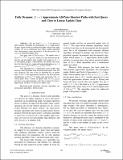| dc.contributor.author | Bernstein, Aaron | |
| dc.date.accessioned | 2010-10-06T15:24:52Z | |
| dc.date.available | 2010-10-06T15:24:52Z | |
| dc.date.issued | 2009-10 | |
| dc.date.submitted | 2009-10 | |
| dc.identifier.isbn | 978-1-4244-5116-6 | |
| dc.identifier.issn | 0272-5428 | |
| dc.identifier.other | INSPEC Accession Number: 11207109 | |
| dc.identifier.uri | http://hdl.handle.net/1721.1/58901 | |
| dc.description.abstract | For any fixed 1 > [epsilon] > 0 we present a fully dynamic algorithm for maintaining (2 + [epsilon])-approximate all-pairs shortest paths in undirected graphs with positive edge weights. We use a randomized (Las Vegas) update algorithm (but a deterministic query procedure), so the time given is the expected amortized update time. Our query time O(log log log n). The update time is O[over ~](mnO(1/[sqrt](log n)) log (nR)), where R is the ratio between the heaviest and the lightest edge weight in the graph (so R = 1 in unweighted graphs). Unfortunately, the update time does have the drawback of a super-polynomial dependence on e. it grows as (3/[epsilon])[sqrt]log n/log(3/[epsilon]) = n [sqrt]log (3/[epsilon])/log n. Our algorithm has a significantly faster update time than any other algorithm with sub-polynomial query time. For exact distances, the state of the art algorithm has an update time of O[over ~](n[superscript 2]). For approximate distances, the best previous algorithm has a O(kmn[superscript 1/k]) update time and returns (2 k - 1) stretch paths. Thus, it needs an update time of O(m[sqrt](n)) to get close to our approximation, and it has to return O([sqrt](log n)) approximate distances to match our update time. | en_US |
| dc.language.iso | en_US | |
| dc.relation.isversionof | http://dx.doi.org/10.1109/FOCS.2009.16 | en_US |
| dc.rights | Article is made available in accordance with the publisher's policy and may be subject to US copyright law. Please refer to the publisher's site for terms of use. | en_US |
| dc.source | IEEE | en_US |
| dc.subject | shortest paths | en_US |
| dc.subject | graph algorithms | en_US |
| dc.subject | dynamic algorithms | en_US |
| dc.subject | approximation algorithms | en_US |
| dc.title | Fully dynamic (2 + epsilon) approximate all-pairs shortest paths with fast query and close to linear update time | en_US |
| dc.type | Article | en_US |
| dc.identifier.citation | Bernstein, Aaron. “Fully Dynamic (2 + Epsilon) Approximate All-Pairs Shortest Paths with Fast Query and Close to Linear Update Time.” IEEE, 2009. 693–702. | en_US |
| dc.contributor.department | Massachusetts Institute of Technology. Department of Electrical Engineering and Computer Science | en_US |
| dc.contributor.approver | Bernstein, Aaron | |
| dc.contributor.mitauthor | Bernstein, Aaron | |
| dc.relation.journal | 50th Annual IEEE Symposium on Foundations of Computer Science, 2009. FOCS '09 | en_US |
| dc.eprint.version | Final published version | en_US |
| dc.type.uri | http://purl.org/eprint/type/JournalArticle | en_US |
| eprint.status | http://purl.org/eprint/status/PeerReviewed | en_US |
| dspace.orderedauthors | Bernstein, Aaron | en |
| mit.license | PUBLISHER_POLICY | en_US |
| mit.metadata.status | Complete | |
